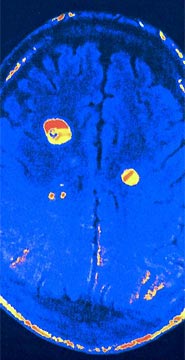 An MRI scan of the brain of a multiple sclerosis sufferer |
Multiple sclerosis could be prevented through daily vitamin D supplements, scientists told The Times last night.
The first causal link has been established between the “sunshine vitamin” and a gene that increases the risk of MS, raising the possibility that the debilitating auto-immune disease could be eradicated.
George Ebers, Professor of Clinical Neurology at the University of Oxford, claimed that there was hard evidence directly relating both genes and the environment to the origins of MS.
His work suggests that vitamin D deficiency during pregnancy and childhood may increase the risk of a child developing the disease.
He has also established the possibility that genetic vulnerability to MS, apparently initiated by lack of vitamin D, may be passed through families.
These risks might plausibly be reduced by giving vitamin D supplements to pregnant woman and young children.
“I think it offers the potential for treatment which might prevent MS in the future,” Professor Ebers said.
“Our research has married two key pieces of the puzzle. The interaction of vitamin D with the gene is very specific and it seems most unlikely to be a coincidence of any kind.”
Warnings over sun exposure could now also be called into question – sunlight allows the body to produce the vitamin.
Professor Ebers said: “Serious questions now arise over the wisdom of current advice to limit sun exposure and avoid sunbathing. We also need to give better advice and help to the public on vitamin D supplements, particularly pregnant and nursing mothers.”
The news has momentous implications for Scotland and other northern countries, where the incidence of multiple sclerosis is the highest in the world. It will give added urgency to recent moves by Scotland’s Chief Medical Officer to consider recommending vitamin D supplements.
Deficiency in vitamin D, caused by lack of exposure to sunshine, has been increasingly linked to the cloudier climate in Scotland and other northern latitudes. The deficiency is twice as common among the Scots as it is amongst the English – and Orkney and Shetland have among the highest rates.
Studies have also shown that fewer people with MS are born in November and more in May, implicating a lack of sunshine during pregnancy.
The breakthrough comes after a groundswell of expert belief in the importance of vitamin D. Last November, at a conference organised by the Scottish Government, international experts urged vitamin D supplements for Scots to be tested “sooner rather than later” to find whether they could improve the nation’s health.
Researchers for the World Health Organisation said there should be large, randomised trials as there was strong evidence that increased daily intake of vitamin D could significantly improve health.
The seminar followed evidence, revealed in The Times, that Scotland’s poor health record has close links to vitamin D deficiency. Last September this newspaper reported evidence from scientists in Canada that children with early symptoms of multiple sclerosis have low levels of vitamin D.
Until now there has been no scientific proof of the links. However, Professor Ebers and his team have shown that vitamin D affects a particular genetic variant, identified as the one that increases the risk of developing MS threefold.
They suggest that a shortage of the vitamin alters this variant, thus preventing the immune system from functioning normally.
Professor Ebers said: “Whether it’s at the core of MS is going to take some further work, but it does look like a reasonably good chance.”
Last October Professor Ebers, in an article in The Times, backed the idea of distributing vitamin D supplements in Scotland to guard against conditions that may be linked to a deficiency, including MS.
“It is plausible that some 200 cases a year of MS might be prevented in Scotland alone by giving vitamin D to mothers and children,” he wrote.
“Over a trial duration of 25 years, 5,000 cases of this disease might be otherwise prevented.
“The economic impact of each person with MS is at least an extra million pounds during a lifetime.
“Over 25 years £5 billion is at issue in this disease without factoring in the human cost, the increasing rate of MS or inflation. A large-scale programme providing vitamin D could provide scientific evidence.”
Disease of the North: MS rates per 100,000 of the population
Canada 240
Scotland 150 – 200
Norway 110
England and Wales 90 – 110
Australia 78
Spain 59
Brazil 18
Sources: Atlas of Multiple Sclerosis; bandolier.com
February 5, 2009
Source: The Times
There is no doubt about it, everyone should know about vitamin D. Take a look at http://www.vitaminD3UK.com for some good summaries. They are also starting a project to supply free vitamin D to children